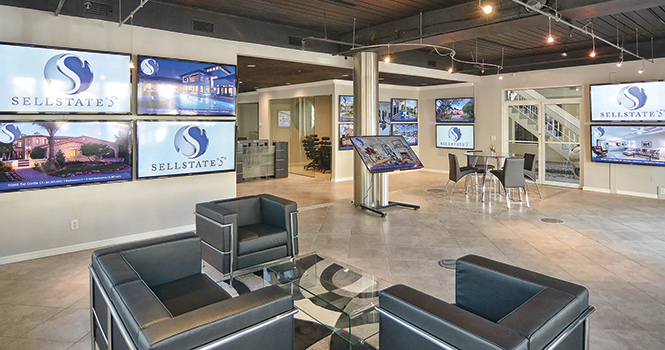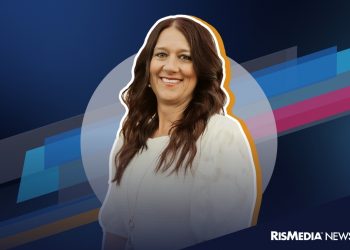Arthur Darmanin is very selective when it comes to bringing new companies into the Sellstate fold. And for good reason. Given the interconnected dynamic that runs throughout the system—from the newest agent all the way up to Darmanin himself—joining Sellstate is for those who are willing to aim high and work together to get there. “We have to make sure we’re all rowing the same way,” says Darmanin, who gives us a look inside the firm he founded with partner Neil Cresswell in Fort Myers, Fla., in 2002, in this exclusive interview.
Maria Patterson: Please describe Sellstate’s distinction in the marketplace.
Arthur Darmanin: We have three main points of distinction: We pay high commission to our agents; we provide breakthrough technology; and we offer revenue sharing.
MP: Why is high commission a priority?
AD: We pay high commissions because to get good, productive agents, you have to pay them well. That’s the reality of the industry. Another reality is, good agents will not join you unless they’re going to do better by closing more deals. That doesn’t mean you do it at the expense of having a profitable business. We believe in paying high commissions, but at the same time, having a business model that makes sense for the franchisee. We use a 95/5 platform. But what’s more than simply offering high commission is showing agents that you can support them. Our philosophy is not only paying well, but making sure we’re helping agents with their business. As a broker, if I can’t demonstrate to you how I can help you make more money, then clearly I have to be the cheapest game in town. But then there will always be someone cheaper than you. It’s a race to the bottom.
MP: So if price isn’t the only factor, how are you demonstrating value to agents?
AD: That’s where our breakthrough technology comes in. In today’s environment, for an agent to compete, they need good technology. Our definition of good technology is lead generation. It’s technology that works and helps you get more listings and more buyers—technology that is user-friendly, has a lot of automation and components that integrate well with each other. You also have to have exposure for your listings on the big sites, like enhanced listings on Homes.com. Our social media is also very robust; we offer a very comprehensive package, and we keep adding to it. To the best of my knowledge, we are the only franchisor where the agent doesn’t have to pay for a robust and complete technology package such as ours. As part of our value proposition, when an agent joins Sellstate, he/she automatically gets the entire package at no cost to them.
MP: What’s one of the newest tech features you’ve added?
AD: We recently added a feature to our Sellstate Power Suite that automatically creates a listing-specific website, flyer, Facebook posts, postcards, etc., for every single listing. All our agents have to do is input the listing into the MLS as they normally would, and all of this magic happens for them. This allows agents to spend less time figuring out technology and more time meeting with buyers and sellers, which is the highest and best use of their time. It also provides our members with a competitive advantage when meeting with sellers, as this package can be offered as a service on every listing.
MP: Tell us more about your third point of differentiation—revenue sharing.
AD: Revenue sharing—not profit sharing—allows the agent to sponsor or recruit another agent into the company. It’s really very simple. All our agents have to do is set up an interview with our managers. If the prospect joins us, our agent will receive 5 percent of that new recruit’s gross commissions. Simple, transparent, and easy to understand. No convoluted formulas. This program also vests, so it has the ability to be a great retirement plan for our agents.
We believe agents are instrumental in the growth of their offices, and this is why we created this system. Right now, the payout average is roughly $1,200 per month to agents who participate in revenue sharing. This is real money for agents, who are already getting a high commission. This adds another dimension to their income. Some may use it for retirement, some for healthcare, some invest it in marketing. Revenue sharing makes agents feel like they’re really part of the system.
MP: What has been your strategy when it comes to growth?
AD: We’ve grown by 30 percent over the last year in terms of franchises and agents. We’re still looking at several states, but we’re focusing heavily on Florida, Colorado and the Carolinas right now because the market has been pretty good and changing quickly. We do have plans to be in another two to three states in the next 12-24 months. As the economy gets better, we’re getting more inquiries, but it has to be from qualified people. Unfortunately, we sometimes have to turn people down. We’re committed to only bringing the right people on board. We have to make sure we’re all rowing the same way.
We’re also growing from within. Some of our franchises have expanded and opened additional offices. We’ll always encourage that type of growth and support one of our current members over a new prospect.
MP: How is the company faring in the wake of Hurricane Irma?
AD: Hurricane Irma had an impact on our Florida operations; however, the recovery only took a few weeks, and we were up and running in no time. What’s interesting is that following storms like this, we tend to see an increase in market activity. Some people decide it’s time to move, while others want to move from a house to a condo. People outside the area tend to have very short memories about these storms and continue buying in the area.
Most importantly, what Hurricane Irma showed us is the true character of our managers and agents. The outpouring of support and help, not only to our own agents, but to the community at large, was unbelievable. I was very proud to be a part of this group.
MP: What type of franchisees are best suited for the Sellstate system?
AD: Sellstate’s flexibility allows us to be the go-to franchise if you want to build a mega franchise, multiple-offices or even a medium-sized franchise. In terms of size, our system is designed to help different business models. Some people want a large agent count in their office. Others don’t want 100 agents—some just want 20 or 30 agents. We can help you get there either way by helping you get productive agents. And that’s really the key—productive agents. If agents aren’t selling, who cares whether you have 30 or 100? Our goal is not to have the biggest numbers—that’s not where it’s at. We’re more about hiring and keeping good, productive agents. For smaller- and medium-sized brokers, we offer the same training and support so they can realize their dream. On the flip side, if you want to build an empire or a mega office, we also have a system for that level of operator.
MP: I understand you involve agents in the operations of their offices in a unique way.
AD: Yes, we engage our agents in the management and running of our offices by creating an advisory council in each and every office. This is comprised of a group of agents selected by each broker who they believe are team players and who have been loyal and demonstrated that they really care about the office and their peers. The council discusses what goes on in the office and talks about how things can be done better.
MP: What is Sellstate’s competitive advantage in today’s real estate market?
AD: Beyond the three-pillar combination of high commission, breakthrough technology and revenue sharing, I would have to say it’s the level of support we give our franchisees and our agents. Our leadership team is accessible all day, every day. If our people need anything, they know they can pick up the phone and ask.
We also do leadership calls with our franchisees where we exchange ideas once a month and get them involved in the direction of the company. We get to hear from them regularly, and they share what they’d like to see from us, what things they’re trying or implementing, and we even get to talk about business development and recruiting ideas. This is just one more way we get all of our folks involved in Sellstate.
MP: So how would you describe your firm’s overall culture?
AD: I’d have to describe it as being all-inclusive. We have a lot of expertise, and we know what our job is, but a day doesn’t go by that I don’t ask, “How can we do things better? How can we help our agents close more deals? How can we help our franchisees make more money?”
MP: What is your approach to coaching and training?
AD: We offer training on many different levels, starting with new agents all the way up to top producers. For us, things need to be done at a certain quality level. As an example, for a long time we didn’t go after new agents because the drop-off ratio for new agents is horrendous due to lack of proper training. At the time, we didn’t feel that we had the necessary training in place to walk them through the beginning stages. Then we made the decision to put together a unique training program specifically for new or struggling agents and allowed some new agents to join our company. I say unique, because unlike many of the other programs that I’ve seen, we established an eight-week course that starts with building a sphere of influence and covers everything from business plans to open houses to farming to technology—in other words, from A to Z of how to succeed in real estate. Students receive a handbook and accompanying workbook and scripts, and the instructors are provided with the PowerPoint presentations, instructor notes and quizzes to ensure consistency with the program.
We also offer weekly and biweekly training on an ongoing basis on everything from negotiating contracts, how to prep your buyer, technology, etc. We have an education calendar in place so that our agents know exactly what is coming up and can plan to attend.
We also have our annual summit for both franchisees and top producers, which is loaded with material specific to their needs. From top to bottom, Sellstate covers coaching and training thoroughly.
MP: How do you stay ahead of the curve on technology, online marketing and social media?
AD: We do all the research and go to the tradeshows ourselves. We’re always researching what’s new and what’s exciting. If you don’t stay on top of it, you’re going to get run over. We have members of our team that spend a great deal of time researching this and even training and writing articles for various publications helping to keep agents informed. When we see things that can help our agents close more transactions, like this new automated listing package, we bring it into the fold, learn it, test it and then roll it out and train on it.
MP: What’s on deck for the future of the firm?
AD: We want to grow, but we’re only going to grow with quality, productive people. The more productive agents appreciate Sellstate’s value proposition because they can see how the company is helping them close more deals. They know that with the tools, support and training we offer, they can do great. We have a multi-pronged approach to what we’re doing, but not at the expense of our integrity and our philosophy. As a franchisor, you have a great responsibility to the people who join you. They have trusted you with their investment and hard work, and you’re the guardian of that. It’s almost like having a shareholder. We’re responsible to them, and we’re accountable to them to do the right thing.
For more information, please visit www.sellstate.com.
Maria Patterson is RISMedia’s executive editor. Email her your real estate news ideas at maria@rismedia.com.
For the latest real estate news and trends, bookmark RISMedia.com.











